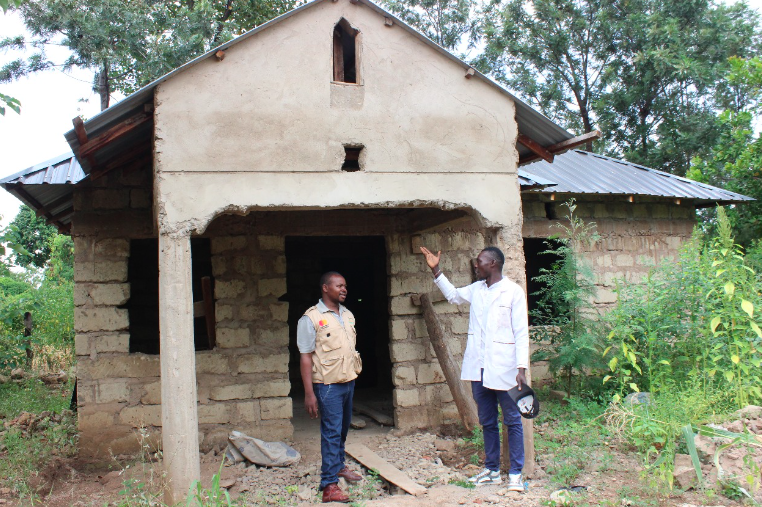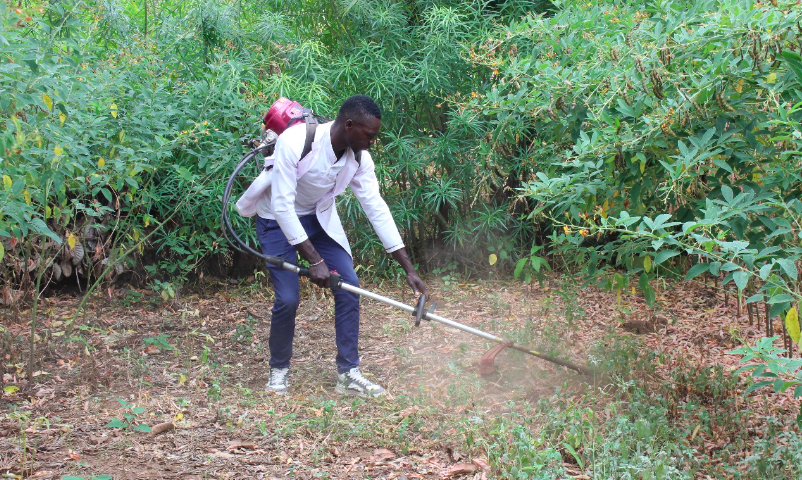 Right, Godfrey Chabari and Africa Harvest CIO Simon Mbae exploring Chabari's ongoing construction at his home in Kitheno in Ciakariga in Tharaka South.
Right, Godfrey Chabari and Africa Harvest CIO Simon Mbae exploring Chabari's ongoing construction at his home in Kitheno in Ciakariga in Tharaka South.
Access to agricultural training and youth empowerment in farming is steadily transforming Tharaka Nithi County, helping to address food insecurity, youth unemployment, and economic marginalization of women, challenges that have long overpowered the area.
Once affected by irregular rainfall patterns, prolonged drought and lack of farming knowledge, food production in the region is now beginning to rebound.
According to county officials, the shift is attributed to renewed investment in training, improved free seed distribution, and the resilience of youth-led farming initiatives.
One such example is 29-year-old Godfrey Chabari from Kitheno village in Ciakariga Ward, Tharaka South, since venturing into farming in 2021. However, it was not until 2023 that Chabari became a model of agricultural transformation.
Chabari an Information Technology (IT) Diploma graduate, turned to cereal farming after losing his job due to the economic fallout from the COVID-19 pandemic.
“I began farming sorghum, green grams, and pearl millet after losing my job in Nairobi. My father opposed the decision, believing farming wasn’t suitable for an IT expert,” Chabari recalled.
Defying expectations, Chabari has converted his three-acre farm into a seed production hub, yielding over 450 kilograms per harvest of green grams, pearl millet or sorghum up from an average of 380 kilograms. Each season, he donates at least 50 kilograms of seeds to his neighbours, helping them improve their harvests and contribute to the region’s food security. He had started off farming on half an acre loaned to him by his father and after doing well leased more land to continue with his farming ventures.
Chabari applauds the Drought Tolerant Crops (DTCs) 4 Youth Jobs Creation programme, implemented by Africa Harvest Biotech Foundation International — lead partner, International Crops Research Institute for the Semi-Arid Tropics (ICRISAT), in partnership with the Mastercard Foundation, for equipping him with essential farming skills.
 Godfrey Chabari preparing the land for next season using the hand weeder.
Godfrey Chabari preparing the land for next season using the hand weeder.
The program trained him as a community trainer, enabling him to guide other farmers while sustaining his own farming enterprise.
“The knowledge I have gained has helped me achieve good
yields, which in turn has allowed me to invest in building a house, starting a
cybercafé at Ciakariga market, and supporting my young family,” said Chabari
who is a husband and father of one.
However, Chabari calls upon his peers to embrace farming and aim to supersede his ability to ensure Tharaka achieve’s food stability.
County Chief Officer Agriculture, Peter Kimathi, acknowledged that farmer training through various empowerment programs have significantly improved the May-June harvest this year.
“This season is better than the last, thanks to slightly improved rainfall and the distribution of certified seeds through county and partner efforts,” he noted.
According to the County’s Monthly Crop Monitor report, between May and June 2025, at least 6000 households in the Arid and Semi-Arid Lands (ASALs) experienced food shortages. However, the situation is expected to improve following the June Harvest, as green grams and sorghum reach maturity. On his side, Simon Kinyua Mbae ,38, the County Implementing Officer for Africa Harvest, expressed optimism about a significant reduction in food scarcity.
“We anticipate a 60 percent drop in food insecurity by the end of this season. The program’s focus on drought-tolerant crops and youth empowerment has significantly improved yields in the sorghum, pearl millet, and green grams value chains,” he said.












